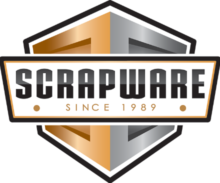The years 2020 and 2021 have posed unique challenges to the scrap metal recycling industry. From the pandemic to labor and supply chain disruptions to new anti-theft regulations and more, recyclers have dealt with a series of issues to stay afloat.
The beginning of a new year presents a great opportunity to get ahead of the game with industry specific software.
For those without a solid software program, huge benefits can be reaped by installing state of the art software. For companies that already have software, it might be beneficial to evaluate if your software can do any more for you. For instance, is your software giving you the cutting-edge advantages of a cloud-based product? Does it include the ability to support remote transactions, like digital signatures, to adapt with changing business practices? Seeking to boost its bottom line, the recycling industry is now increasingly utilizing the operational benefits of recycling software. There are numerous benefits of recycling software, but most fit into three primary categories: profitability, regulatory and anti-theft compliance, and inventory management.
Profitability
Managing pricing and contracts and optimizing fleets of trucks and their routes are just a few of the areas in which software can help make decisions that impact the bottom line. Software can manage materials, cash, shipping, sales and inventory. Over the past several years, software has enhanced recycling business owners’ ability to make choices and set up systems to enhance profits and facilitate business growth. If you have better data giving you insight into your business, you can make better decisions. Here are some of the key areas where software can help increase profits by increasing efficiency:
Managing Purchases, Quotes and Contracts
At the most basic level, working with software programs eliminates the pieces or paper and spreadsheets that are far less efficient and time consuming. But, that is just the start of the benefits to be realized from using software to manage these aspects of your business.
Nothing impacts the bottom line like the purchasing process. With software keeping track of purchases, recyclers can have quick access to an assortment of pricing methods. Software can also help handle quotes and contracts. Software packages can provide businesses with a simple, efficient way to produce, track and process each quote and contract. With the software’s insight, recyclers can improve productivity and adapt purchase and sales decisions according to the every changing market conditions to boost profitability.
Scrapware, a popular software package for the scrap metal recycling industry, can rapidly create quotes and then track those that have been issued back to vendors as well as quotes received from consumers. Then, when businesses are ready to make a deal, they can save valuable time by easily converting quotes into contracts. This helps increase profitability because businesses can quickly determine which consumers offer the best prices for a given commodity, view the open and closed quotes and contracts with vendors or consumers, and then decide what material to ship first.
Route Optimization and Fleet Management
With the advent of GPS technology and route optimization software, incredible efficiencies are available to recycling businesses as they can save money by making sound decisions about their fleet use. Fleet dispatching software optimizes precision scheduling for container movements and vendor servicing. Recyclers can receive updates on truck fleet activity and driver activity and productivity. Using this software, recyclers can get an overview of total composite costs. They can also simultaneously dispatch at multiple locations while providing reporting to one central location.
Container and trailer tracking software also can improve efficiencies by reducing manual, redundant tasks while gaining visibility over rollingstock. It can be used to track the asset type, purchase date and see updates on container location and determine container and vendor turnover. Recyclers can download container locations to mapping software to provide a detailed street map of container locations throughout an operating area. These maps can then be used to help dispatch staff optimize scheduling for fleets.
Regulatory and Anti-theft Compliance
As the popularity of recycling programs has increased, so has the regulatory burden on recycling businesses. Much of the regulation, especially in the scrap metal recycling business, has to do with cracking down on the theft of valuable materials. Law enforcement is stepping up measures to catch thieves and is penalizing scrap yards where they sell stolen material. Police are seeking to partner with yards to help them track down the material and prosecute lawbreakers. Here are some of the features that good recycling software packages should have in place to help recycling businesses comply with a variety of state and local laws.
- License scanning – License scanners allow recycling businesses to scan vendors’ drivers licenses and immediately and permanently associate those with a purchase ticket. These can be kept on file and accessed if there are law enforcement inquiries.
- Signature and thumbprint capture pads – These can be used to link a thumbprint or a signature to a purchase ticket. The data can be reproduced for any ticket requested by police.
- Network digital camera interface – Cameras can be linked with a scale interface to take photographs of incoming material. These photos can be printed, saved, emailed or uploaded to compliance websites, like Leads Online.
- Tag and Hold – As theft of valuable material has become more common, a number of state and localities have passed “tag and hold laws” to track down stolen material, return it and catch the thieves. Many software recycling systems include a mechanism to print tickets that comply with these laws and avoid a shut down.
- Payment method – The use of Automated Teller Machines (ATMs) and other cash dispensers allow recyclers to choose payment methods that are most appropriate for complying with state and local laws. A good recycling software package will integrate with ATMs and cash dispensers. This eliminates the need for cashiers to handle cash, reducing the likelihood of internal theft. These systems also reduce the likelihood of cash robbery.
- Anti-theft reporting – Most recycling software generates a variety of reports to help comply with state and local anti-theft laws. These reports can be uploaded to law enforcement or kept on file to retrieve when they are requested by police at a later date.
- Date files – Leads Online, BWI, Texas DPS. These are just some of the places recyclers upload data files to comply with local laws, usually, again, targeted at anti-theft measures. A good recycling software system will allow recyclers to upload files to these organizations and others from different states and of different formats.
In the glass recycling industry, software has been developed to provide “proof of recycling.” According to industry publications, glass recyclers and bottle manufacturers are beginning to use “tracking software” to help increase glass recycling and create awareness with consumers. Material recovery facilities, waste management companies and glass manufacturers can trace glass from curbside bins to new products with the use of this software. According to “Recycling Today,” programs exist which can then issue a certificate verifying the amount of recycled material used in a glass bottle. With efforts such as the glass recycling tracking, governments and consumers are spearheading efforts to move industry to a more circular economy. A circular economy is a system aimed at eliminating waste and being regenerative in making new products. These efforts will only increase the demand for recycling and thus the new laws and regulations aimed at the recycling industry.
Inventory Management
Recycling is an inventory-based business. Recyclers need to have a firm grasp of what they have in stock, at what yards and at what costs. Software can put this information at a recycling business’s fingertips, giving them visibility over all inventory in real time.
Scrapware’s inventory management system allows you to set up, maintain and manage your inventory in three ways. The first way is to “Regrade” it, which allows you to regrade a purchased raw material to a finished good and/or one or more commodities. Secondly, they can “transfer” inventory, which lets them move material between yards or from one division to another within the same yard, without cost information. Finally, the inventory can be moved to “finished goods.” This classification enables them to place processed, packaged finished goods, such as bales and boxes, into inventory. The Finished Goods system can be interfaced with the Sales module to remove finished goods from inventory after shipment.
Using software to manage inventory in this way can help a recycler to: define commodity categories, classes and subclasses; track average pricing based on perpetual weighted moving average cost and modify that cost if need be; print and scan barcode tags for finished goods inventory; and integrate with all other aspects of the business for seamless efficiency.
To keep pace with our move to a circular economy and meet consumer and government demand for less waste, the recycling industry will continue to see massive leaps in innovation. The operational benefits of recycling software play a key role in this evolution and can help a scrap metal recycling company gain a competitive advantage in 2022 and beyond.
About ScrapWare Corporation: Since 1989, Rockville, Maryland-based ScrapWare Corporation has been the software of choice for the recycling industry. Its ease of installation and simplicity saves users time and money, while helping them achieve compliance and maintain accurate business insights. With state-of-the-art functionality that‘s tailored to each organization’s unique requirements, ScrapWare is an advanced dynamic software solution that alleviates the most pressing recycling industry worries. For more information, please call (301) 517-8500 or visit https://www.scrapware.com/.

